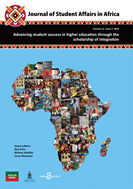Envisioning My Best Future Self: Integrating Positive Psychology and Prospection in Student Affairs Practice
DOI:
https://doi.org/10.24085/jsaa.v12i2.5259Keywords:
Best possible selves, Positive psychology, Prospection, Qualitative research, Student affairs, Student counselling, Mental health, Hope theoryAbstract
Students’ psychological well-being constitutes a critical issue that necessitates support and dedicated intervention from student affairs professionals. Positive psychology, focusing on future-oriented prospective thinking, offers valuable insights and methods relevant to student affairs. This paper leverages the principles of Positive Psychology, particularly prospection, and reports a qualitative study that explored how 45 university students (26 females and 19 males; age range: 18-23) conceived of their best future selves. Phenomenological analysis revealed a dynamic interplay between students’ optimistic visions of personal and professional success, and the pressing need for practical strategies to realise these aspirations. By integrating and leveraging Positive Psychology, particularly prospection-focused methodologies, practitioners can support students in envisioning their futures more clearly and translating ambitious visions into tangible outcomes, thereby fostering individual and collective growth.
Downloads
Published
Issue
Section
License
Copyright (c) 2024 Henry Mason

This work is licensed under a Creative Commons Attribution-NonCommercial-ShareAlike 4.0 International License.
Authors who publish with this journal agree to the following terms:
Authors retain copyright and grant the journal right of first publication with the work simultaneously licensed under the Creative Commons Attribution Share-alike 4.0 International License that allows others to share the work with an acknowledgement of the work's authorship and initial publication in this journal.
Authors are able to enter into separate, additional contractual arrangements for the non-exclusive distribution of the journal's published version of the work (e.g., post it to an institutional repository or publish it in a book), with an acknowledgement of its initial publication in this journal.
Authors are permitted and encouraged to post their work online (e.g., in institutional repositories or on their website) prior to and during the submission process, as it can lead to productive exchanges, as well as earlier and greater citation of published work (See: The Effect of Open Access).


